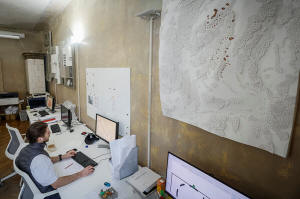War upends Ukraine's economy in a shift that may be permanent
 Send a link to a friend
Send a link to a friend
 [May 09, 2024] By
Olena Harmash [May 09, 2024] By
Olena Harmash
KYIV (Reuters) - Within days of Russian forces invading Ukraine in early
2022, architect Oleh Drozdov made up his mind: he would move his home
and business from the besieged eastern city of Kharkiv more than 1,000
km to the west, far from the fighting.
Now, with the war in its third year, his practice may finally be
returning to growth, as businesses like his adapt to the conflict and
search out opportunities alongside the formidable challenges.
"The storm is over. There are many holes in our boat but we are moving
forward," Drozdov said from his offices in a historic building in the
centre of Lviv, a city of some 700,000 people close to the Polish
border.
On the city's outskirts, cranes dot the skyline and industrial parks and
other projects are being built.
In some ways Drozdov & Partners is well placed to adapt to the shock of
war. It is small and footloose, and, in a country where millions of
people and thousands of companies are displaced, demand for buildings
and renovations is high.
"Some new opportunities have started to open up slowly," said Drozdov.
"There are investments in this part of the country as businesses and
people are relocating."
His practice is among 19,000 companies that have registered in new
locations within Ukraine since the invasion, according to Opendatabot,
which provides data from official registries, in a mass migration of
businesses from east to west that may never be reversed.
"Thanks to the adaptability of businesses, support from partners and
government programs, Ukraine is increasingly taking on the
characteristics of a wartime economy," First Deputy Prime Minister Yulia
Svyrydenko told Reuters.
"If we compare the economy's structure in 2023 with that of pre-war
2021, we clearly see this transformation. The Ukrainian economy is
showing resilience and adaptability ... proving its ability to navigate
through difficult times."

WEST WINS FOR NOW
In the east of Ukraine, where fighting has raged during offensives and
counteroffensives, towns and villages lie in ruins. Kharkiv is being
heavily bombed.
A study by the World Bank, United Nations, European Commission and the
Ukrainian government published in February estimated the total cost of
rebuilding the economy at $486 billion, a figure that continues to rise
as more damage is incurred.
Far to the west, urban centers are faring better.
Viktor Mykyta, regional governor in Zakarpattia which borders Poland,
Slovakia, Hungary and Romania, described a rush of new businesses
ranging from salt production to furniture and textiles.
Before the war, the mountainous region's economy relied heavily on
tourism and remittances sent home by Ukrainians working abroad.
"When the war broke out, a lot of businesses moved, jobs were created,
the budget began to be filled," Mykyta said.
Officials in Lviv region report a similar trend, with logistics, energy,
construction and IT firms among those setting up operations there.
Of the few wartime foreign investments announced, most are in central
and western regions - in part because they stand to benefit most should
Ukraine succeed in its aim of joining the European Union one day,
analysts said.
[to top of second column] |

An employee works in the reopened office of Oleh Drozdov, an
architect from Kharkiv, amid Russia's attack on Ukraine, in Lviv,
Ukraine, March 11, 2024. REUTERS/Alina Smutko

Projects include Turkish Onur Group's plans to invest $50 million in
graphite mining in western Khmelnytskyi region and a further $150
million in renewables in Zakarpattia.
Germany's Bayer said it would invest 60 million euros in its corn
seed production facility in central Zhytomyr region, while Ireland's
Kingspan Group has announced a $280 million investment in a facility
in Lviv region.
Back in Kharkiv, Ukraine's second city, the reality is very
different. Oleh Synehubov, the region's governor, said 70% of large
enterprises have been destroyed or relocated or suspended their
operations.
"Our regional and city budgets have fallen by 40%," he told Reuters.
World Bank data shows that businesses in eastern Ukraine experienced
a 70% slump in sales between the invasion and the end of 2023, and
those in the south a drop of 63%. In comparison, companies' sales in
the west decreased 39%.
NEED FOR WORKERS
Official data on the impact of the war on different sectors is
patchy, and recent trends could change if there are dramatic shifts
on the battlefield. Russian attacks on energy infrastructure is also
a major challenge for many firms.
After the economy collapsed by a third in 2022, it rebounded by 5.3%
in 2023 and the government forecasts growth of 4.6% this year. The
steel industry, once Ukraine's key exporter, contracted by about 80%
in 2022 and grew only 8% in 2023.
The economy ministry said that so far in 2024, the fastest pace of
growth has been in construction, processing, transport and retail.
The defense industry has also expanded significantly. According to
Ukraine's strategic industries ministry, the number of defense
manufacturers has more than doubled since February, 2022.
As some sectors have expanded, job vacancies have grown fastest in
the west of the country, according to Work.ua, an employment portal
which reported a record number of wartime vacancies in April.
Vacancies were up 55% in Zakarpattia at the end of February compared
with pre-war levels while Lviv region had about 8,500 vacancies open
at the start of March, up 23% from before the invasion.
A recent survey from the European Business Association, one of
Ukraine's leading business groups, showed that about 74% of
companies have suffered staff shortages - the result of millions of
people fleeing overseas and hundreds of thousands of men serving in
the military.
Drozdov has struggled to hire enough staff at his practice and to
fill vacancies at an architectural school that he also runs.
Mindful of the long term task of rebuilding the country, Drozdov is
launching a masters program for young architects with a focus on
rebuilding the shattered east. He hopes to return one day to Kharkiv.
"When there is an opportunity we will return there physically. It
will be a gradual process."
(Editing by Mike Collett-White and Christina Fincher)
[© 2024 Thomson Reuters. All rights
reserved.]
This material may not be published,
broadcast, rewritten or redistributed.
Thompson Reuters is solely responsible for this content.
 |